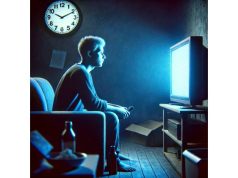
Psilocybin-containing “magic mushrooms” captivate curiosity with promises of mind-bending colors, spiritual insights, and—according to emerging clinical trials—potential relief from depression and anxiety. Yet their mystique can mask a quieter reality: some people slip into repeated, compulsive use that blunts daily motivation and fractures mental health. While classic hallucinogens create far less physical dependence than alcohol or opioids, tolerance, psychological craving, and risky behavior can still spiral into what clinicians label a psilocybin use disorder. Understanding how that cycle forms—and how to step off—is the first step toward balanced well-being.
Table of Contents
- Current Landscape and Usage Patterns
- Why Some People Keep Returning: Roots and Risk Makers
- Telltale Signs, Experience Profile, and How Clinicians Assess
- Ripple Effects on Body, Mind, and Social Life
- From Reorientation to Renewal: Evidence-Based Help and Ongoing Growth
- FAQ
- Disclaimer
Current Landscape and Usage Patterns
A snapshot of psilocybin in 2025
Magic mushrooms have long inhabited religious rites from Meso-American ceremonies to modern New Age retreats. In recent years they’ve leapt into mainstream headlines thanks to clinical trials exploring psychedelic-assisted therapy for depression, PTSD, and end-of-life anxiety. As public perception warms, personal experimentation has followed suit:
- Rising lifetime use: Surveys in North America and Europe show lifetime psilocybin exposure climbing from ~8 % a decade ago to 15–20 % among adults today.
- Micro-dosing trend: Tech hubs and creative circles popularized sub-perceptual “micro-doses” taken several times a week to boost mood or focus.
- Online access: Spore kits, grow tutorials, and mail-order “truffle” markets bypass traditional gatekeepers.
- Decriminalization waves: Cities such as Denver, Oakland, Detroit, and Vancouver now deprioritize personal-use enforcement, reducing legal deterrents.
Key nuance: Most users partake occasionally without major fallout, yet a subset escalates frequency, chasing mystical breakthroughs, mood lifts, or simple escapism—paving the road toward problematic use.
Why Some People Keep Returning: Roots and Risk Makers
Neurochemical magnets
Psilocybin metabolizes into psilocin, a potent serotonin 2A agonist. This flood of 5-HT2A activity:
- Dissolves “default-mode” rigidity—users feel thoughts, memories, and emotions flowing freely.
- Launches sensory fireworks—colors intensify, sounds pulse, time bends.
- Creates rapid tolerance—within 24 hours, receptors down-shift, prompting higher doses if use continues daily.
While physical withdrawal is minimal, the psychological imprint—anticipation of euphoria, insight, or relief—can prime craving.
Psychological accelerants
- Unresolved trauma or depression—some self-dose repeatedly hoping to replicate therapeutic study outcomes.
- Identity exploration—teens and young adults may adopt psychedelics as a badge of counter-culture belonging.
- Spiritual bypassing—seeking shortcuts to enlightenment instead of slower practices like meditation or therapy.
- Novelty-seeking personalities—individuals wired for intense experiences may binge on back-to-back trips despite diminishing returns.
Social-environmental boosters
| Context | How it nudges repeated use |
|---|---|
| Psychedelic festivals/retreats | Group norms encourage frequent dosing over several days. |
| Online “trip report” forums | Constant stories spark FOMO and dose escalation. |
| Micro-dosing work culture | Peer testimonials normalize weekday ingestion. |
| Easy home cultivation | Abundant supply lowers natural barriers to restraint. |
Protective factors—stable mental health care, supportive relationships, clear life goals—buffer against compulsive patterns.
Telltale Signs, Experience Profile, and How Clinicians Assess
Behavioral red flags
- Increased frequency—from monthly ceremonies to weekly, then multiple times a week.
- Dose escalation—larger grams per session or layering with MAOIs to prolong effects.
- Preoccupation—hours spent reading trip reports, planning grows, or arranging the next journey.
- Neglected duties—missed classes, workdays, or parenting tasks during comedown lethargy.
- Risk stacking—combining psilocybin with LSD, MDMA, or ketamine for “hippie flips.”
Acute psychological and physical markers
| Phase | Common signs |
|---|---|
| Intoxication (4–6 h) | Dilated pupils, giggling or tearfulness, perceptual distortions, nausea, unsteady gait. |
| Afterglow (24 h) | Elevated mood, introspection, reduced appetite, mild fatigue. |
| Crash (with heavy use) | Brain-fog, irritability, sleep disruption, craving for “clarity” via another dose. |
Clinical assessment
Although DSM-5-TR groups psilocybin under “Hallucinogen Use Disorder,” clinicians look for at least two criteria within a year:
- Taking larger amounts than intended.
- Persistent desire or failed attempts to cut down.
- Excessive time obtaining, using, or recovering.
- Craving.
- Role impairment.
- Social fallout.
- Hazardous use (e.g., tripping and driving).
- Continued use despite health issues.
- Tolerance (rapid with psychedelics).
- Note: Withdrawal is minimal, so that criterion rarely applies.
Tools like the Hallucinogen Use Questionnaire and collateral interviews with family or friends help gauge severity.
Ripple Effects on Body, Mind, and Social Life
Physiological concerns
- Cardio strain: Psilocybin spikes heart rate and blood pressure—risky for those with cardiac conditions.
- GI distress: Repeated large doses irritate stomach lining, causing vomiting and diarrhea.
- Accidental poisoning: Misidentified wild mushrooms can cause organ failure.
- Sleep debt: Frequent late-night trips fragment circadian rhythm, impairing immunity.
Mental-health fallout
| Domain | Potential consequence |
|---|---|
| Anxiety & panic | “Bad trips” trigger lingering hypervigilance or agoraphobia. |
| Hallucinogen Persisting Perception Disorder (HPPD) | Flashbacks, visual snow, trailing lights long after stopping use. |
| Depersonalization | Feeling detached from body or reality in the weeks following binging. |
| Mood swings | Cycling between euphoric afterglows and irritable lows. |
Cognitive and functional costs
- Motivation drift: Constant introspection can sap goal-oriented tasks like study or career advancement.
- Decision errors: Tripping in unsafe settings leads to injuries, legal trouble, or sexual risk.
- Financial strain: Money funneled into spores, gear, and festival tickets.
- Relationship tension: Loved ones may feel neglected or alarmed by sudden philosophical shifts.
Bottom line: Even without classic withdrawal, compulsive psilocybin use can quietly erode physical safety, mental clarity, and social stability.
From Reorientation to Renewal: Evidence-Based Help and Ongoing Growth
Immediate steps for cutting back
- Short tolerance break: Because receptors reset quickly, a two-week pause slashes craving intensity.
- Remove cues: Store or discard dried mushrooms and deactivate spore-kit reminders.
- Sleep restoration: Prioritize 7–9 hours nightly—consistent rest rebuilds serotonin balance, curbing urge to dose.
- Nutrition & hydration: Whole foods, omega-3s, and plenty of water support neurochemical repair.
Professional treatment pathways
| Approach | Primary targets | Practical example |
|---|---|---|
| Motivational Interviewing (MI) | Ambivalence, readiness | Explore conflict between spiritual goals and missed work deadlines. |
| Cognitive-Behavioral Therapy (CBT) | Trigger thought loops | Reframe “I can’t access creativity without mushrooms” into evidence-based coping. |
| Mindfulness-Based Relapse Prevention (MBRP) | Craving management | Body-scan meditation when thoughts of dosing arise. |
| Trauma-informed therapy | Underlying pain | EMDR or somatic therapies for childhood adversity driving escape behavior. |
| Psychoeducation groups | Peer accountability | Share harm-reduction tactics and sober-curiosity goals. |
Pharmacological support
No medication treats psilocybin addiction directly, but clinicians may prescribe:
- SSRIs or SNRIs for co-occurring anxiety or depression.
- Beta-blockers to manage panic symptoms.
- Sleep aids (non-habit-forming) like trazodone or melatonin for rebound insomnia.
Harm-reduction tips for ambivalent users
- Set & setting discipline: Only dose in safe spaces with sober sitters.
- Spacing strategy: Minimum two-week gaps prevent tolerance stacking.
- Dose logging: Journal grams, context, and mood impacts to identify diminishing returns.
- Avoid polydrug cocktails: Combining with alcohol, MDMA, or MAOIs multiplies risk.
- Emergency plan: Keep contact list and hydration supplies on hand; know nearest hospital route.
Building a life beyond mushrooms
- Integrate insights: Translate trip revelations into concrete goals—journaling, therapy, volunteer work.
- Practice slow spirituality: Yoga, breathwork, and meditation provide non-chemical pathways to altered states.
- Creative outlets: Art, music, or dance channel psychedelic inspiration into lasting projects.
- Community connection: Join sober-curious networks, nature clubs, or service groups that spark meaning without substances.
- Celebrate milestones: Mark 30-, 90-, 180-day stretches with experiences (hiking trip, skill workshop) rather than drugs.
Hope note: Research shows most people who develop hallucinogen use disorders recover fully—often transforming lessons from their experiences into healthier, purpose-driven lives.
FAQ
Can psilocybin cause physical dependence like opioids or alcohol?
No. Psilocybin doesn’t create classic physical withdrawal, but psychological cravings and rapid tolerance can still fuel compulsive use and life disruption.
How fast does tolerance build with magic mushrooms?
After one full-dose trip, serotonin receptors down-regulate for about two weeks. Dosing sooner produces weaker effects, tempting people to double up.
Are micro-doses addictive?
Regular micro-dosing rarely triggers hallucinations, yet daily routines can become ritualistic and hard to quit, especially if used to mask anxiety or low mood.
Is psilocybin safer than LSD?
Psilocybin trips are typically shorter and milder, but safety hinges on dosage, mindset, and environment. Both can cause panic or persistent perceptual changes with heavy use.
What’s the first step if I want to cut back?
Take a tolerance break of at least two weeks, secure any remaining supply out of reach, and share your goal with a trusted friend or counselor for accountability.
Can therapeutic psychedelic sessions reduce addiction risk?
Clinical settings emphasize preparation, guided dosing, and integration therapy—factors shown to lower compulsive follow-up use compared with unsupervised recreation.
Disclaimer
This material is for educational purposes only and does not replace personalized medical or mental-health advice. If you suspect problematic psilocybin use in yourself or someone you care about, consult qualified professionals promptly.
If you found this guide helpful, please share it on Facebook, X (formerly Twitter), or your favorite platform, and follow us for more evidence-based, compassionate resources. Your support empowers us to keep creating content that changes lives—thank you!






